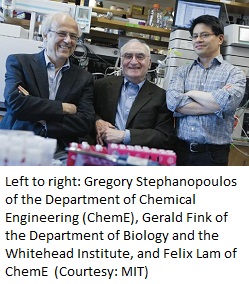 Ethanol producers might get more production out of the yeast they use, thanks to researchers at MIT. This news release from the school says scientists have added potassium and an acidity-reducing compound to the yeast that helps it tolerate higher concentrations of the ethanol it’s making without dying.
Ethanol producers might get more production out of the yeast they use, thanks to researchers at MIT. This news release from the school says scientists have added potassium and an acidity-reducing compound to the yeast that helps it tolerate higher concentrations of the ethanol it’s making without dying.
Aided by those “supplements,” traditionally underperforming laboratory yeast made more ethanol than did industrial strains genetically evolved for ethanol tolerance. The supplements also enabled lab yeast to tolerate higher doses of high-energy alcohols such as butanol, a direct gasoline substitute. In other “firsts,” the researchers described the mechanism by which alcohols poison yeast; they defined two genes that control ethanol tolerance; and they modified those genes in lab yeast to make them out-produce the industrial strains — even without the supplements.
Manufacturers worldwide rely on yeast to convert sugars from corn or sugar cane into ethanol, a biofuel now blended with gasoline in cars and trucks. But there’s a problem: At certain concentrations, the ethanol kills the yeast that make it. As a result, a given batch of yeast can produce only so much ethanol.
“The biggest limitation on cost-effective biofuels production is the toxic effect of alcohols such as ethanol on yeast,” says Gregory Stephanopoulos, the Willard Henry Dow Professor of Chemical Engineering at MIT. “Ethanol is a byproduct of their natural metabolic process, as carbon dioxide is a byproduct of ours. In both cases, high doses of those byproducts are lethal.”
Efforts to grow genetically modified yeast weren’t successful, but it did give the researchers the idea for adding the common chemicals.

